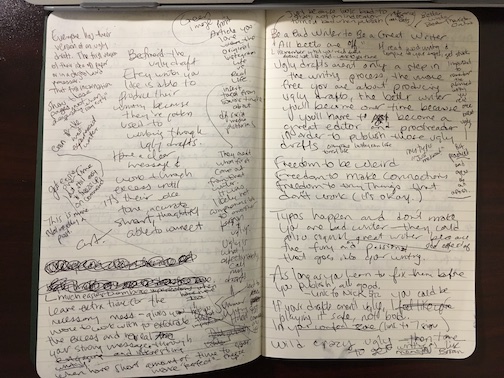I wrote about writing practice last week for a specific reason.
Summer is quickly arriving here in the Northern Hemisphere, and when the seasons change, I reevaluate my habits and goals.
- What should I stop doing (aka, What’s not working?)
- What could I optimize?
- What would I like to add to my routine?
You probably see where I’m going with this … you can also seize this time to refine your habits and goals.
And if your writing sessions ever feel unproductive, I have an eye-opener that will help you approach them with more ease.
Introducing the Necessary Mess
One reason we struggle w/ insecurity: we're comparing our behind the scenes to everyone else's highlight reel.
— Steven Furtick (@stevenfurtick) May 10, 2011
If you’re not an editor, the articles you read online are the final versions of those articles.
That’s obvious, yes, but we often don’t stop to think about all of the versions of a piece of content that existed before it was published.
It might look like it was created effortlessly.
You picture the author opening up their WordPress dashboard, selecting a New Post, and typing out a coherent draft. After a little editing and proofreading, they’re ready to publish.
If it were only that straightforward.
So, today I want to highlight what goes on in Draft Mode, especially the nonsensical nature of most drafts.
The first version of an article typically just needs to translate an idea into some words.
Here’s a sample of one of mine.

My handwriting is sloppy. There is no logical order. It’s simply what I needed to start crafting my thoughts … and it eventually led to the post you’re reading right now.
If you look closely at the image above (please don’t), you’ll see that the term “Necessary Mess�? was originally “ugly draft.�? Ultimately, “Necessary Mess�? felt more precise.
Your version of the Necessary Mess might look completely different. It could be a bulleted list or a collection of digital notes. Regardless of the format, embracing it helps relieve some of the tension of getting started on a project.
Check out these four pillars of a Necessary Mess that you can incorporate into your writing practice.
1. Write what’s easy
If you’re trying to achieve the quality of another author’s “highlight reel�? when you write your first draft, you’re likely going to be disappointed and frustrated with your “behind the scenes.�?
Instead, write what feels easy, even if your ideas aren’t fully formed.
When I’m not quite sure what I want to communicate, writing anything helps me relax.
My go-to tactic for a while has been to type the word “something�? over and over again in a digital document. I eventually get tired of looking at the word “something�? and what I really want to write about emerges.
I also recommend writing out the lyrics to a song you like or inventing a funny poem. Those tangents that jump-start your process can be powerful parts of your creative journey.
2. Schedule enough time
You can afford to spend time “writing what’s easy�? when you don’t have a tight deadline.
If you don’t give yourself enough time to write, you’re going to feel pressure to write the Most Eloquent Words in Your Brain right away.
But prolific writers know that “decent,�? “weird,�? or “good enough�? often precede the “best�? versions of their content. They need the time to explore “decent,�? “weird,�? and “good enough�? in order to arrive at “best.”
3. Accept ridiculous mistakes
This is the “Mess�? part of “Necessary Mess.�?
- Glaring and not-so-glaring typos
- Awkward phrases
- Improper grammar
- Spelling errors
- Confusing punctuation
Approaching your topic in a thoughtful way almost requires a certain fervor that harbors making mistakes.
So don’t sweat it if you accidentally write something like “All beets are off.�?
4. Sculpt your art
As I mentioned before, you’re not going to publish the Necessary Mess; it’s a tool that helps you uncover the main point of your article.
Then you remove the parts that convolute your main point.
You work through a Necessary Mess until someone else can clearly understand and benefit from it … until it becomes a Nectarous Message.
And as you publish and promote your Nectarous Messages over time, you’ll build an audience of people who want to hear what you have to say.





Reader Comments (21)
#2 is important for me. When I know that I am crunched on time my writing gets sloppy and my head feels clogged and I get careless. When I know I have a solid hour to write I slow down, let thoughts flow, and get some good writing out.
I think when I am crunched for time I know that “my words have to be good and have to count.” Instead, when I have plenty of time to write I know “I have time to write what I want a few times and then pick the best.”
Thanks for this post!
Exactly, Christopher!
My process is the same, and when I have more time, it doesn’t bother me if my draft is weaker than I’d like it to be — I know I have time to experiment and refine. 🙂
Steven’s tweet perfectly sums up my happiness and clarity with my writing. I am at peace being me, and then, being me some more, and then simply sharing my thoughts – being me the whole time – in written word, then publishing it with my blog, and self-publishing via eBooks. When you remove labels from writers, and are just being you, in the written word, folks will love you for it and also, will buy your stuff and hire you and follow you. Success finds authentic writers who are clear on their seeming imperfections, all of which make them believable, credible and approachable by the masses of readers out there.
Digging this post.
Ryan
Ah yes, Ryan, “seeming imperfections.”
I very well could have put “bad” in quotes in the headline. 🙂
“One reason we struggle w/ insecurity: we’re comparing our behind the scenes to everyone else’s highlight reel.” This has everything. Thanks for such a wonderful post.
Thank you for this fantastic article…it has helped me immensely. I am a bit of a perfectionist and find myself trying to write the final product first…needless to say that is very frustrating. This has given me a new perspective and something to reread when I find myself slipping back into old habits.
I’m happy you’ll be able to use it as a reminder, Stacie! 🙂
Thanks for this wonderful post! I’m a perfectionist myself, and my ideas are over the place whenever I write. I’ll take note of what you’ve written and apply them whenever I work on my articles.
Right message at the right time. Now I know I’m on the right track when my first draft doesn’t make much sense. Thanks for this article
It’s certainly nice when a first draft makes sense, but no need to fret if it’s not quite there yet. 🙂
I use freewriting to beat the blank page. So I might start with “I want to write about X because of Y…” and then see where it takes me. a) It puts something on the page and b) there’s usually something of value in there!
Yes! I love that “hack,” LJ. 🙂
A simple statement like that can get you right to the core of what you want to communicate/the value you’re aiming to provide.
This. My initial mess is all over the place. I especially like to free-flow everything out, and then refine it. I used to do all this in a notebook (love your photo!), but I’m so much faster on the computer. Then I let it percolate, and come back through and sweep the cobweb ideas, and polish the nuggets of gold.
Sending my students to this article – they often think that the first draft is the final piece, no matter how much I prepare them for edits. Thank you!
Thinking that the first draft is the final piece is such a common block.
And it takes a while for it to sink in that it’s not … but it’s so freeing when that mindset shift happens and you start viewing your initial work as pieces to shape into your true vision. 🙂
#2 for me is the one. Schedule and routine.
The greatest writers have always set aside time and a place for their craft. Mediocre writing only develops into great writing with practice, repetition – and usually, a lot of frustration, monotony, and despair!
Stephen King, in his memoir ‘On Writing’ explains how he would often sit at his desk for hours, fully aware that the words he typed were uninspired, second-rate, and destined for the wastebasket.
But he sat and persisted, because he knew the very act of spending the time, and forcing himself into a routine was making him into a better writer.
Writing is refined thinking. And the more we practice, the better we become at expressing and communicating the sometimes thoughts and ideas bubbling around in our heads.
Great example, James!
This is so true! I coach writers in writing books and more as well as create posts and podcasts for my own blog. Keeping clients…and myself…in creative mode rather than “perfect” mode is a constant task.
I really appreciated the shot of your handwritten copy. It looked so familiar! After reading your post, I came away energized to keep going with what I do, with what I love. Thanks for sharing!
I had to get to a point where I was comfortable enough to share that handwritten draft.
Ultimately, I thought it could do some good and contribute to exposing that the very important “creative mode” is far from “perfect.” 🙂
Hi Stefanie,
This is an awesome post. I agree that being overly careful about spelling and grammar when we write the first draft hinders our ability to write valuable content. We can either focus on ideas or on punctuation. We simply shouldn’t be focusing on doing both at the same time. Not only do I benefit from writing ideas freely, but it also helps in my writing time. I end up writing a long post relatively quickly and then edit it out before publishing (of course, the editing process is much different).
Thank you for sharing this!
I love sharp editing, but you don’t get to that point in the creative process until you have solid ideas in a draft. 🙂
No doubt, people look for reliable information. If you are calling yourself a bad writer, it’s going to be hard enough to be that. In fact, each time when we write we improve our writing. Think well before writing each line and take your full time when you are before your writing desk. It is to the writer’s advantage to writing what comes to their mind leaving the editing and improving later – so-called proofreading.
This article's comments are closed.